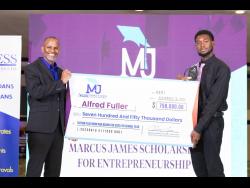At just 19 years old, Alfred Fuller has already lived a life characterised by sheer grit, resilience and vision, proving on Wednesday that perseverance can turn struggle into opportunity.
The aspiring entrepreneur and St Jago High School alumnus walked away with the inaugural Access Financial Services (AFS) Marcus James Scholarship for Entrepreneurship, a win his mother prayed for.
Growing up in a single-parent household in Bog Walk, St Catherine, Fuller shared how he watched his mother, Larnett Squire, stretch scarce resources to provide for him and his two sisters, all while instilling in them the values of humility and gratitude.
“My mother always told me that even if you don’t have much, you must still give thanks and work for what you want. That spirit has stayed with me; gratitude for what I have, and determination for what I can build,” said Fuller.
It took considerable determination to overcome the hurdles placed before the young scholar. Some mornings, he had to decide whether to spend his last $100 on bus fare to get to school or to leave it at home to help with family needs. At just 13 years old, he began selling sweets at St Jago High School, turning what could have been the cause for disciplinary action or a source of ridicule into the foundation of his entrepreneurial journey.
“People would see me with my little bag of sweets and laugh. But I never minded, because I had a goal. Even though it started small, it showed me that you can make a difference with whatever you have in your hands,” he asserted.
That spirit of enterprise grew and earned for him the respect of his peers. Fuller went on to lead four school clubs, including the Social Entrepreneurship Club, where he launched projects like Books for Change, redistributing gently used books to children in need. He also excelled as a national-level decathlete, balancing academics, athletics, and leadership with a quiet resilience that spoke louder than words.
Profit and purpose
Now a first-year student at the University of Technology, Jamaica, pursuing a bachelor’s in business administration, Fuller dreams of building enterprises that combine profit with purpose.
“Some people see entrepreneurship as a career; I see it as a responsibility,” he affirmed. Among his ideas is a digital platform linking small farmers directly with urban consumers to reduce waste and boost income. Fuller also plans to create a social enterprise that produces affordable study materials, so no student has to choose between bus fare and textbooks.
It is this vision that earned Fuller the distinction of becoming the first recipient of the AFS Marcus James Scholarship for Entrepreneurship. Valued at $750,000 annually and renewable for up to three years, the scholarship not only supports tuition, but also covers the cost of room and board, and provides technical business development assistance through partnerships with organisations such as the Jamaica Business Development Corporation.
‘Someone believes in my potential’
For Fuller, the scholarship is about far more than financial relief. “This scholarship tells me that someone believes in my potential. After almost facing the harsh reality of not continuing my tertiary education because I simply could not afford to, I don’t want to be the type of recipient you never hear from again. I want to do the best I can with this opportunity so that Access Financial and Jamaica can see the results of their investment.”
Named in honour of Access Financial Services’ founder and executive director, Marcus James, the scholarship is part of the company’s broader commitment to empower Jamaican youth and contribute to nation-building through education and entrepreneurship.
“By investing in students like Alfred, we’re not just investing in the education of our youths, but also planting seeds for sustainable businesses that can uplift communities. In this, our 25th year of operations, we want to deepen our footprint in the community, and we have been doing that through programmes like this scholarship and Access Hope, through which we donated more than $6.2 million for community initiatives earlier this year,” said James, adding that community empowerment is a key driver of national development.

